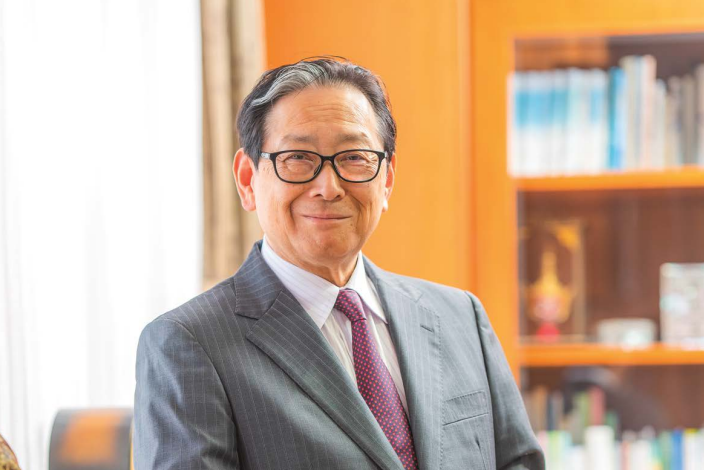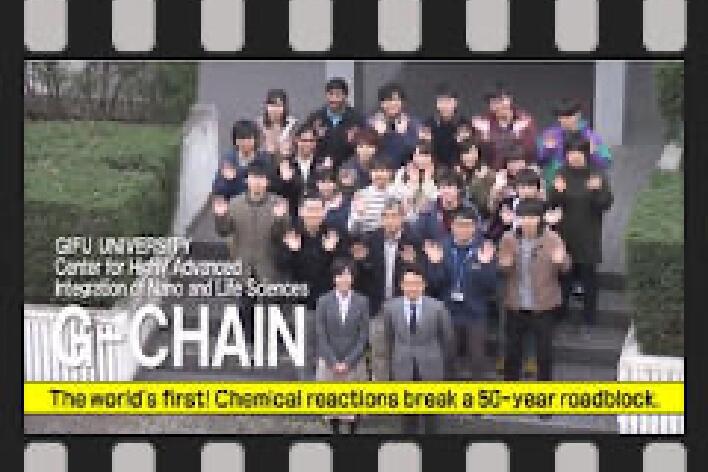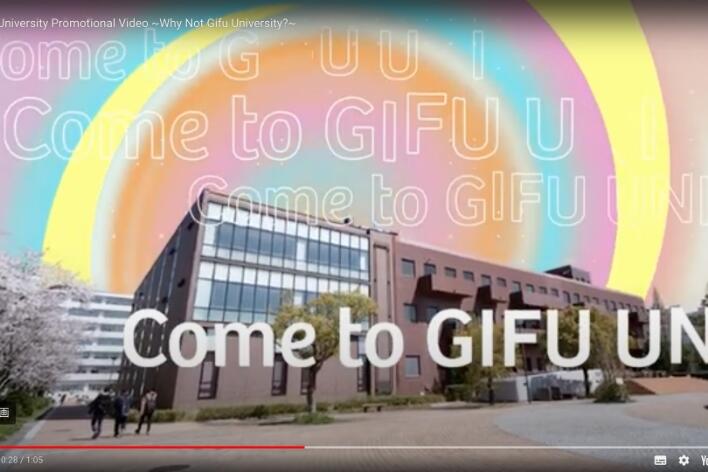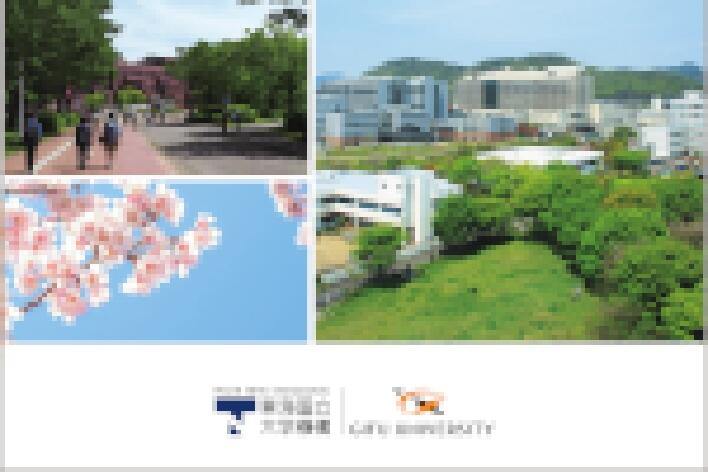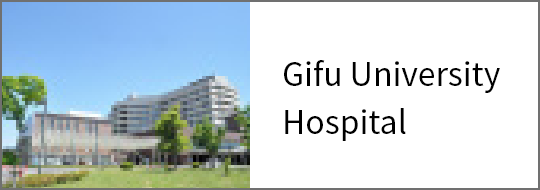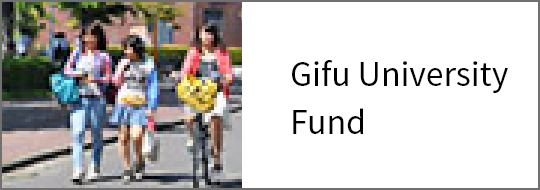Gifu University's visions and strategies: Endeavors to become Japan's best academic hub for the community
Gifu University has formulated new visions and strategies in order to strengthen our comprehensive research capabilities, specifically in the fields where the university can capitalize on its academic strengths and enjoys global competence. With our new visions and strategies as a guiding light, we serve the best interests of the community by promoting strong growth and continued development for a better future.
As a constituent member of the Tokai National Higher Education and Research System (THERS), Gifu University is bolstering its competitive edge and contributing to community advancement.
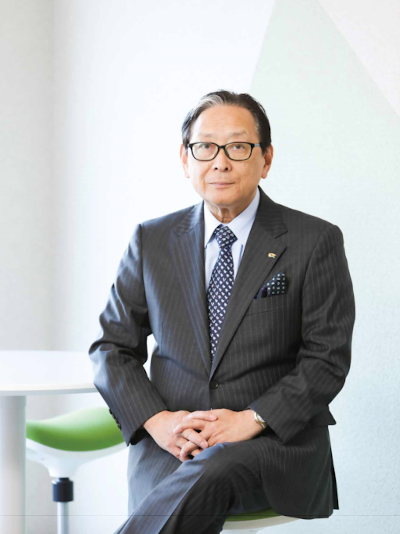
As a regional hub university, Gifu University has been focusing on the following four objectives to build a better future for the community: 1) "Town Planning," 2) "Development of Education and Character," 3) "Production of Food and Goods," and 4) "Provision of Healthcare." Consistent involvement in the four objectives by all faculties and schools of Gifu University has been a driving force in our efforts for "community co-creation" with all stakeholders concerned.
We launched THERS in April 2020, bringing together two national universities, Gifu University and Nagoya University, into a single framework. We are leveraging our academic resources and assets for the benefit of the community within this entirely new academic framework.
Some concerns were raised in the early days of THERS operation because of uncertainties about this new framework. However, thanks to a strong partnership with Nagoya University, our confidence in better performance in education and research, as well as in our deep ties with the community, continues to grow. In other words, THERS provides us with significant momentum towards our long-term goals and missions. Today, I sense the dynamics and vibrancy of all Gifu University members who are working together for a better future.
Many universities and colleges in Japan are facing a decrease in the young population aged 18 years and older. Gifu University is no exception. Adopting the aforementioned four objectives stands to broaden our perspective and enhance our contribution to community-building, which should help us combat this mounting social problem. For example, the creation of new businesses will prompt civic development and revitalize the local community. It may, then, induce demographic change in the region. If more people settle down in the region, the young population will increase accordingly. With a steady enrollment of students at schools, advancement of education becomes possible. Gifu University's new model for value-creation, "Migration, Laboratory, Innovation and Education" (MLIE), results in this virtuous cycle of innovations, new businesses, and dynamic change in the community.
Now, let me introduce some notable examples of Gifu University's increasing research capabilities since joining the THERS framework.
First, let us look at the current research initiatives of the Institute for Glyco-core Research (iGCORE), one of the four Directives of THERS and a world-class integrative glycoscience research hub.
Research on "glycans"*1 was advanced by Professor KISO Makoto (Professor Emeritus of Gifu University) in the 1970s. Since the commencement of THERS, Nagoya and Gifu universities have been mutually complementing our roles in advancing glycans research. Simultaneously, we have been maximizing synergistic effects through constant competition. The completion of the iGCORE research building on the campus of Gifu University in 2023 will accelerate the university's campaign to secure government funding for its pioneering glycans research projects.
Second, I would like to introduce the Aerospace Research and Education Hub (AREH), jointly established by Gifu University and Gifu Prefecture with support from the Cabinet Office of Japan. Its major missions are the advancement of aerospace technologies and human resource development. Since its opening in April, 2019, the Intelligent Production Technology Research & Development Center for Aerospace (IPTeCA) has been playing a central role for AREH. Already, as one of four Directives of THERS, AREH is embarking on "Cyber Physical Factory" projects to assist a wide range of manufacturing businesses in the community.
Third, I would like to mention the "Core Facility." Students and researchers from both universities are benefitting from the shared use of large-scale machinery known as the "Core Facility," which allows them to engage in their studies and research more effectively than ever before.
Gifu University has been offering unique and distinctive educational programs to students, giving the university a major advantage over the years.
When THERS began operation, Gifu and Nagoya universities jointly created the "Academic Central" as one of its four crucial directives. Currently, it is providing educational curricula on mathematics and data science, science, technology, engineering, art, and English for students of both universities, and a common evaluation basis is used for students. It keeps on expanding its curricula to include specialized subjects for more students. Under the guidance of the Academic Central, Gifu University continues doing its utmost to secure high-quality education and guarantee proper evaluation for students as well as faculty members.
Co-creation with the community is a key term for our new visions and strategies
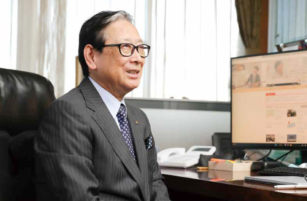
In 2022, THERS, Gifu University, and Nagoya University jointly announced new visions and strategies to realize the following four missions: 1) "Education, Development of Human Resources," 2) "Research and Value-Creation," 3) "Collaboration with Society and Partnership among Industry and Academia," and 4) "Global Engagement."
While sharing THERS' mission of "Make New Standards for The Public" and upholding Gifu University's own long-term ideals of "Learning, Exploring and Contributing," we advocate the following as cores of our new visions and strategies for the future: "strategic promotion of co-creation with the community," "execution of unique, original research projects," "sparking of innovations," "provision of quality education," and "serving as a hub for community revitalization to address various issues of humanity."
In relation to these cores of our visions and strategies, allow me to highlight some of our new projects for 2023.
In addition to the initiatives already undertaken by iGCORE, we are planning to build one of the most progressive bases for life sciences in Japan to advance new medicine and drug discovery. All relevant faculties of Gifu University including medicine, veterinary and pharmaceutical sciences, drug discovery, etc. are important stakeholders in building this base for life sciences, which will be bolstered by the Faculty of Applied Biological Sciences in combining the fields of life sciences, food sciences and agriculture. In addition, because Nagoya University Hospital serves as a clinical research hub hospital and Gifu University Hospital plays a similar role for the community, both hospitals can play their parts in building the base for life sciences. Gifu University is already working on constructing a new clinical research framework that encompasses hospitals and clinics near the campus. Our ultimate goal in this framework is to create a comprehensive region-based clinical research platform, which makes the whole central Tokai region a "general hospital." We hope that the new base for life sciences and comprehensive clinical research platform will attract research institutions and businesses related to drug discovery and new medicine, and become a center of knowledge and information in the future. The assembly of pharmaceutical companies and food manufacturing firms around the base can induce a large influx of people and the formation of a new city. Energy consumption by businesses and households there may stimulate renewable energy-related enterprises to form a cluster of business enterprises around the base, as everyone is currently working to achieve carbon neutrality.
On the educational front, I would like to mention the selection of Gifu University by the Ministry of Education, Culture, Sports, Science and Technology (MEXT) to develop the "Gifu Region Human Resource Development Program - to establish academic infrastructure for regional revitalization*2" under the "Human Resource Development for Regional Revitalization: Supereminent Program for Activating Regional Collaboration 2022." Under the framework of this program, Gifu University will forge strong ties with Gifu City Women's College, Chubugakuin University/Chubugakuin College, and other national, public, and private universities. Specifically, we will be involved in the joint creation of new curricula and in strengthening the partnership among industry-government-academia and banking institutions to provide region-rooted education and proceed with creating a framework for regional revitalization.
For our global engagement, we must prioritize the promotion of international collaboration to serve as an academic hub for the community. If we are not needed by the world, the community will not need us. People who are highly valued in the world can also assume an important role in their communities. Under this assumption, we will continue to strengthen international collaboration among students and faculty members with our partner universities overseas. We welcome highly skilled students and staff members with strong ambitions and commitments to succeed because they are the true drivers of our campus' internationalization. We are looking forward to seeing many Gifu University students and staff members expand their activities overseas, and we believe their outbound activities are an integral part of our campus internationalization efforts. Gifu University currently has 50 university-level agreements and 62 faculty-level agreements, and the numbers of both university- and faculty-level partnerships are likely to grow. The Joint Degree Programs (JDP, four international master's and PhD degrees) with the Indian Institute of Technology Guwahati (IITG, India) and the National University of Malaysia (UKM, Malaysia) were launched in April, 2019 to accelerate the internationalization and enhancement of educational and research capabilities among the three universities. New JDP schemes in collaboration with Gifu University's partner universities in Southeast Asia and region-wide international exchange via industry and academia collaboration are also under consideration.
2023 is the year of progress and reform for THERS and Gifu University
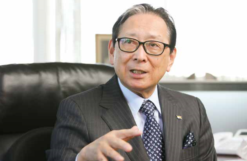
The year 2023 is one of the most important years for every member of THERS and Gifu University, as it marks the fourth year since THERS was launched. It is the year to make a quantum leap based on our accomplishments over the past three years. This year, the primary mission for Nagoya University is to be selected as the "university of global academic excellence" by the MEXT, and for Gifu University, it is the consistent implementation of our visions and strategies as an academic hub for the community.
The following events and plans in 2023 will take us a step closer to the realization of our visions and strategies.
First, the operation of the Center for One Medicine Innovative Translational Research (COMIT), which commenced in January 2023. COMIT is considered to be a crucial player in the "Gifu City Life Science Base Concept" initiated by the Gifu City Government to make the entire community an academic and research base for life sciences. There have been several positive developments. For example, the newly inaugurated "Gifu Interchange" of the Tōkai-Kanjō Expressway (Tōkai Ring Expressway) in 2024 will provide businesses and institutions with easy access to the Gifu University campus from both within and outside of Gifu Prefecture. Its opening will help the region bolster business and academic collaboration. Second, the relocation of Gifu Pharmaceutical University buildings to the Gifu University campus in 2028 will give the concept another boost in its actualization.
Other major events and plans in 2023 include the activities of the Academic Central and our commitments to implementing the "Digital University Concept." The Academic Central continues to develop new educational systems and improve academic and research environments as one of the key Directives of THERS. Our commitment to the "Digital University Concept" is to spark digital transformation on campus. We will proceed with a dynamic campus digitalization that extends beyond the boundaries of general and specialized subjects for our students. Lastly, we will continue supporting start-ups originated in Gifu University through collaboration among industry, academia, and governments as part of our community co-creation endeavors.
We will continue to work diligently to make Gifu University and our community a venue for future generations to realize their dreams and hopes by putting our new visions and strategies into practice. I would appreciate your understanding and kindly request your continued support and assistance in our efforts to fulfill our missions in 2023.
*2) Tentative English name
